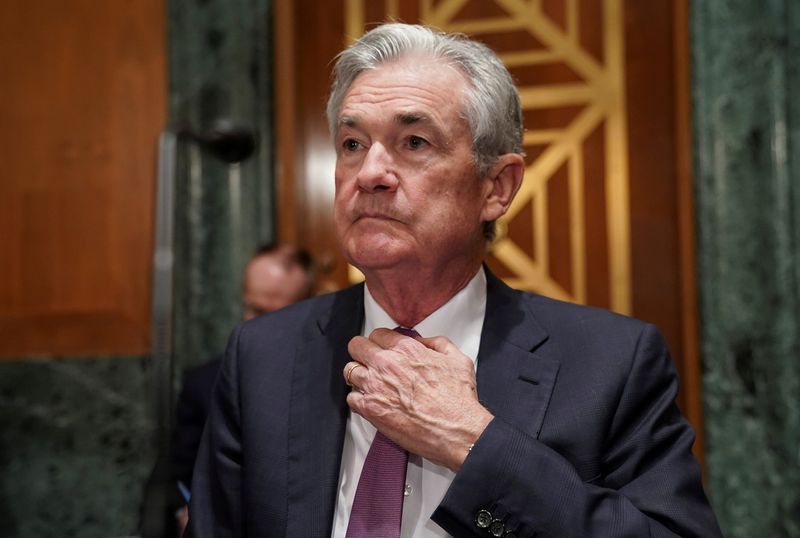By Howard Schneider
WASHINGTON (Reuters) - Federal Reserve Chair Jerome Powell's belief that the U.S. economy has "learned to handle" the coronavirus and won't be swamped in a fresh wave of infections or by rising inflation may get tested in coming weeks as schools reopen, supply chains remain clogged, and federal unemployment benefits wane.
Data released on Thursday showed the risk ahead as the country navigates the transition from an economy dependent for the last year on federal government benefits to one where those emergency programs expire and private incomes take over.
The economy returned to its pre-pandemic level of output in the second quarter, according to gross domestic product data released by the Commerce Department on Thursday, a rebound that came earlier than many expected. But the report also showed personal income dropping alongside a decline in federal transfer payments and the economy growing at an annual rate of 6.5%, slightly below the 7% expected by the U.S. central bank.
It was massive federal stimulus, unemployment benefits and other payments that led to the "better-than-anyone-expected" outcomes during a coronavirus surge last summer, which Powell cited on Wednesday as evidence that each COVID-19 wave has had successively less economic impact.
Those government payments are disappearing just as concerns rise around the spread of the more infectious Delta variant of the virus, putting a new note of caution around the U.S. growth outlook.
Graphic: Personal income has risen on government spending: https://graphics.reuters.com/USA-ECONOMY/REOPENING/xlbvgqongvq/chart.png
Despite second-quarter GDP being slightly lower than expected and the Delta variant "a key downside risk," Lydia Boussour, lead U.S. economist for Oxford Economics, said she continued to anticipate 7% growth for the full year as supply-chain problems ease, goods get onto shelves, and consumers continue spending.
"We still expect the economy to maintain strong momentum," she wrote in a note.
By contrast, Paul Ashworth, chief North America economist at Capitol Economics, painted a dour economic picture in which the Delta variant becomes a drag and rising prices cut into household purchasing power. Inflation measures in Thursday's GDP report, at greater than 6%, are the highest since the early 1980s when the Fed was battling entrenched price increases.
Ashworth said economic growth may slow to just 3.5% in the second half of the year, "with the impact from the fiscal stimulus waning, surging prices weakening purchasing power, the Delta variant running amok in the South."
(Graphic: Jobs lagging GDP: https://graphics.reuters.com/USA-FED/JOBGROWTH/xegpbzzrbpq/chart.png)
'DEFIANTLY UPBEAT'
Powell issued his blunt assessment of COVID-19's threat to the economy during a news conference on Wednesday to discuss the Fed's latest policy meeting. In their statement, policymakers said the economic recovery appeared on track, that the impact of the virus on the economy continued to wane, and that the economy was making progress toward the day when the Fed could reduce some of the emergency steps taken in 2020 to nurse the economy through the pandemic.
Coupled with earlier changes, the Fed's actions this week continued the central bank's steady divorce between the ongoing pandemic and the outlook for the economy.
Epidemiologists have warned from early on that the coronavirus would not disappear - with true herd immunity a stretch goal in a country with high levels of vaccine hesitancy - but rather be a part of the social and economic background for years to come.
The Fed, in successive steps, has seemed to adopt to that view. Since April it has stopped referring to the pandemic as a factor weighing on the economy, emphasized the impact of vaccinations, and this week said, in effect, that the virus would remain as a future risk, but not a significant one.
"We’ve kind of learned to live with it," Powell told reporters. Even with the Delta variant filling hospitals in some parts of the country, "with a reasonably high percentage of the country vaccinated and the vaccine apparently being effective ... the effects will probably be less. There probably won’t be significant lockdowns and things like that."
Whether that remains the case will be seen through the late summer and fall. Some companies already have delayed the planned return of their workforces to offices, potentially pushing out the day when downtown retail stores and restaurants see their weekday traffic return.
(Graphic: Jobs and COVID-19: https://graphics.reuters.com/USA-FED/COVID/movanmymdpa/chart.png)
Powell acknowledged that, at the margins and for a while at least, the Delta surge could lead to further complications if school districts delay the reopening of in-person learning, or if sidelined workers wait a few more weeks to return to their jobs.
But for now, and absent a clear darkening of the economic outlook, it won't derail Fed planning that anticipates continued job growth, and needs to manage the risks of potentially higher inflation as well.
Diane Swonk, chief economist at Grant Thornton, called Powell's commentary this week "defiantly upbeat," and listed the hurdles his outlook faces - from the Delta variant to the slow, ongoing efforts of millions of unemployed workers to match themselves with new jobs.
The new infection surge "has already delayed the return to offices for some companies to later this year," Swonk wrote. "We are becoming accustomed to spending during outbreaks, as Powell noted ... That spending has been supported by fiscal stimulus. That will wane as we enter 2022."
